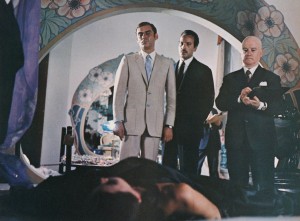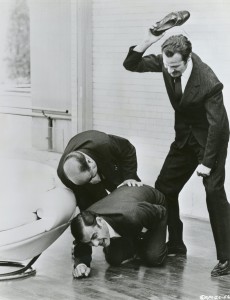by Barb Lentz.
The five movies Bob provided me from which to choose were these:
Far from the Madding Crowd (1967)
Investigation of a Citizen Above Suspicion (1970)
The Killing Fields (1984)
Mister Roberts (1955)
State of the Union (1948)
I chose Investigation of a Citizen Above Suspicion because after Gunga Din and Wuthering Heights I wanted to see something more modern. It sounded interesting, and we had not yet critiqued a foreign-language film. It’s also a film of which I had never heard before Bob brought it to my attention.
The story opens with a bizarre situation: a woman asks her lover “How will you kill me tonight?,” and then he does kill her! Another shock awaits when we learn that her lover is a high-level police official, and that he is put in charge of her murder investigation. Then, gradually, he unravels psychologically, until at last he is begging his superiors to punish him for the crime and they instead demand that he confess his innocence!

The psychological aspects are what intrigue me more than its political or procedural elements. We see the unnamed Chief of the Homicide Squad (Gian Maria Volonté) kill the woman (Florinda Bolkan) and then take his time after the murder, leaving clues to his own culpability all over the place. We don’t know why he has killed her, though flashbacks to their romantic trysts begin to fill the gaps. What remains mysterious is exactly why he did what he did, and why he continues to prod people toward fingering him as the murderer. Is it because he is leaving the Homicide Squad behind to become the force’s Political Officer? Is it because he feels guilty not only about this woman but past victims of police brutality under his regime? Is it because his own conscience is so strong that it won’t let him get away with the crime? Is it because he just cannot stand her any more, or because she threatens his position on the police force? Is it because he has always wondered what it would be like to actually kill someone instead of investigating the people who do? The only clues to his obviously deteriorating state of mind are his actions, which are very difficult to interpret. I may be wrong but I don’t think an American film on the same subject would be as ambiguous or open to interpretation as this one is.
The story is very political, and very much a product of its time. Material on the DVD helps explain the political unrest in Italy at the time this film was made, and why it seemed so timely. Now, it is more satirical, especially when the Chief delivers his big speech encouraging the police force to repress the people! It’s hard to accept that he actually believes what he is saying; maybe he just takes his new posting a little too seriously. In any case, the political aspects take a back seat to the driving force of the story, which is the Chief’s crisis of conscience, if that is what it is.
My top five aspects of the movie are:

1. That I was fine with the film’s foreign language and subtitles. I was worried that they would be too distracting, taking me away from the film itself, but I had no such problem. And the foreign-ness of the story — and its treatment — are a welcome change from some of the dumb American movies we’ve seen.
2. I was startled by the murder at the beginning of the story, but it certainly grabbed my attention. Then, a series of flashbacks with the woman and the Chief fill in their relationship and provide clues as to why he kills her. The flashbacks give the woman dimension that nameless victims do not receive, building our compassion for her death; yet they also demonstrate that she was almost goading him into the act!
3. It was important to me that the Chief suffer mental anguish after the crime. He does, though it takes some time to build. I still don’t know if he is genuinely sorry for what he has done, but at least the guilt is weighing upon his mind. And I don’t know if he felt immediately guilty and left the clues in the apartment because of that, or if Bob’s theory that he was testing his own men’s investigational acuity is why he implicated himself in every way possible before leaving the scene of the crime is the truer scenario.
4. I liked the dream sequence (at least I think that’s what it was) wherein the Chief is questioned by his superiors at his home, pummeled with his own shoe and then forgiven. It seems like he is imagining what is about to occur, with the caveat that he wishes to be acquitted of any wrongdoing. It galls me that the police would so protect one of their own, even after he admits killing someone, but I also see that they believe they are protecting the institution rather than the individual.

5. I enjoyed the acting, especially of the Chief, Gian Maria Volonté. It is a nuanced performance that slowly reveals the pressures he is facing in his new position and the guilt he feels about killing his mistress. In plenty of instances, such as immediately following the bomb attack, he must be absolutely sincere in his police work, and yet at others is duplicitous and mysterious, wanting his former staff at the Homicide Squad to deduce that he is the killer, but hoping against that outcome at the same time. The Chief’s interactions with the plumber (Salvo Randone) regarding the blue tie illustrate the tightrope he is walking. The Chief knows that forcing the plumber to buy all of the blue ties could very easily, and should, identify himself as the killer. Nevertheless, the Chief pressures the plumber into doing so, only to meet him at the police station, where the plumber refuses to recognize him!
I think it is very interesting that in a movie where political bombings occur, and where police routinely jail and interrogate groups of radicals about such bombings, the biggest issue up for discussion is whether this one police official is so far above the law that the “system” will refuse to properly investigation and punish him for killing someone. This highly personal situation is at the heart of the debate about justice, then and now, and continues to be a problem with which we must come to terms. This movie is satirical in tone, yet poses a serious question: if the police avoid prosecuting their own criminal activities, who will protect us from them?
Is Investigation of a Citizen Above Suspicion a classic? Yes, I think so. It holds up well, partly because its scenario could happen anywhere. Its very ambiguousness adds a timelessness to the proceedings which is compelling. It catches you right from the beginning with the woman’s strange question and the murder, before the big surprise that he is in a position to cover it all up. But then he doesn’t! I found this to be a fascinating film because of its psychological mysteries.
BRL 12 March 2015.
Investigation of a Citizen Above Suspicion (February 9, 1970)
Vera Films / Columbia.
Directed by Elio Petri. Produced by Marina Cicogna and Daniele Senatore.
Written by Elio Petri and Ugo Pirro.
Principal Cast (character, performer):
The Chief Gian Maria Volonté
Augusta Terzi Florinda Bolkan
Questore (Police Commissioner) Gianni Santuccio
Sergeant Biglia Orazio Orlando
Antonio Pace Sergio Tramonti
Mangani Arturo Dominici
Nicola Panunzio Aldo Rendine
Augusta’s husband Massimo Foschi
Plumber Salvo Randone
Patanè, the journalist Fulvio Grimaldi
112 minutes. Color. Widescreen (1.85:1). Subtitled. Rated R.
